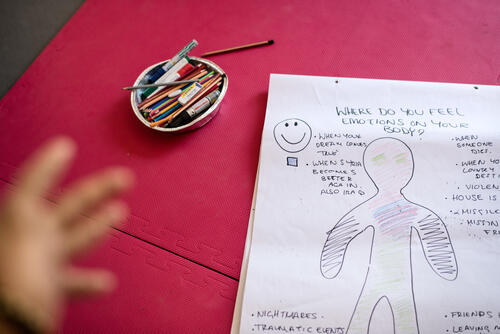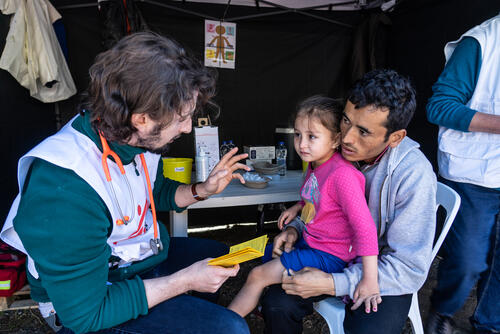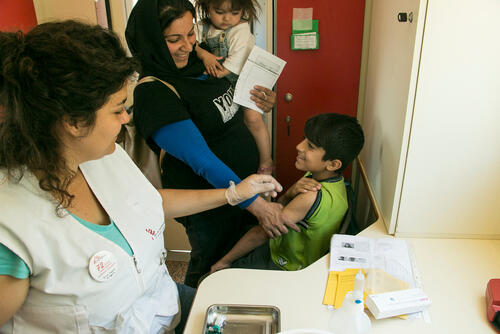Myriam Abdel Basit is an Irish cultural mediator who has spent seven months with MSF in Greece this year.
Working alongside a psychologist, she met countless displaced children in Moria camp, which houses more than 7,500 refugees in a space meant for 3,100.
After fleeing violence, war, persecution or poverty, people crossed the Aegean sea only to be stranded here, in overcrowded, unsafe and unhygienic conditions, as they wait to be allowed to travel on to the mainland.
My role was as an Arabic-speaking cultural mediator, helping to facilitate communication between the children and our health staff, and speaking to children about what they’d been through.
Part of my role was to work with a psychologist during psychotherapeutic sessions with children aged between eight and 17, who had symptoms of trauma after leaving their homes.
We ran activities that helped these children recognise the emotions they were feeling, and also helped them cope with nightmares, bedwetting and any other signs of trauma and anxiety.

Children's suffering in Moria camp
Writing therapy
A really interesting part of the therapy process used storytelling to help children deal with their trauma. We split patients into groups and they worked together to create a book about one or two fictional characters who had gone on a similar journey to them.
We divided the book into chapters: before, during and after the war; the decision to leave their country; their journey to Greece; and life in Moria.
We also had sections about their experiences in MSF’s psychotherapy sessions and, finally, the ‘happy ending’ and their hopes for life after they leave Moria.
Although the characters were fictional, the children projected their own experiences through them.
This proved to be really therapeutic and cathartic, as they could release all the pent-up feelings and experiences that they would otherwise find hard to talk about. By the end of process, the character felt real.
We read the stories out at a ceremony in front of the children’s families and friends. It was very emotional.
Many parents were shocked that their children had remembered so much about the war and their journey to Greece.
Talking about his emotions helped him understand feelings he didn’t realise he had beforeMyriam Abdel Basit, MSF cultural mediator
A safe place to talk
Telling these stories was very important for the children. They were finally able to express their feelings about what they had been through.
Some of them were quite reluctant to talk to their families because they didn’t want to upset or put any further stress on them. These children are still living in the refugee camp and many of them feel it's not really the right environment to share their thoughts.
One 17-year-old told us that he felt a huge amount of sadness but, as the oldest of his siblings, he thought he had to keep smiling and hide his feelings in front of his family.
He said he was really grateful to have a safe space to talk, where he didn't have to fear upsetting anyone. It was important to him that there were no consequences for speaking freely.
He said that talking about his emotions helped him understand feelings he didn’t realise he had before.
By the end of the therapeutic process, there were visible changes in his mood and demeanour. He was really into rap music and at the book ceremony he performed a rap about some of the racial and religious tensions in the camp.
When we first met he was quieter, more introverted and sad, so it was remarkable to see how far he’d come.
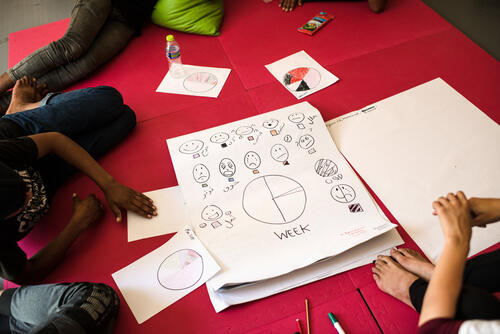
Stories of lives left behind
It was very common in the storytelling process for the children to share their memories of life under the so-called Islamic State group in their respective cities.
One 14-year-old boy told us that he would walk around his neighbourhood and see heads placed on steel rods, which had been dispersed throughout the town by the group.
Another child, described the arrival of the so-called Islamic State group, how they treated the local community and the atrocities they committed.
It was very moving to help these children with their stories as it felt like we were writing history, told from a child's perspective.
Children continually spoke about the sadness they felt because they were not able to say goodbye to their friends, families and classmates.
So, in one of the stories we had, the characters write a goodbye letter to all the people they had left behind.
It was incredibly moving. When it was time to read it out at the ceremony, everyone was crying.
One teenager explained it perfectly when he said, “Yes, I have lost six years, but I’m going to make it up. We all have a future ahead of us.Myriam Abdel Basit, MSF cultural mediator
Planting hope for the future
We spoke at length with the children about their dreams, aspirations and what they’re going to do after this experience is over.
We’re not giving them false hope, but rather helping them to think about feelings that are already there.
Many of the children already have hope – they just need to hold on to it.
One teenager explained it perfectly when he said, “Yes, I have lost six years, but I’m going to make it up. We all have a future ahead of us. We have dreams that we will pursue and I’m sure that most of the refugees here today have talents and aspirations that they will accomplish in the future.”
Parents gave the most incredible feedback. They told us their children were so much happier after our sessions.
I also think the parents found the book-reading therapeutic, particularly the last chapter about life after Moria.
Many parents had lost hope, but rediscovered it through their children. One mother told us that we had given her hope that there is life after the camp.
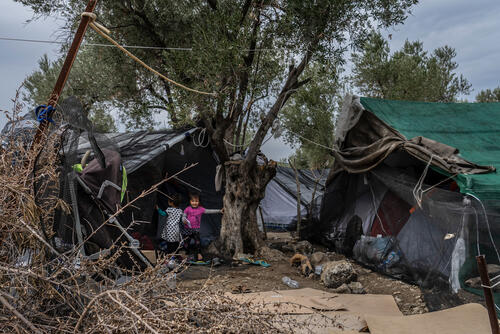
Working through trauma
There was one eight-year-old child who, as a result of trauma, had rejected his nationality and where he was from. When he started our sessions, he was very introverted and always had tears in eyes.
His mother told us that he wanted nothing to do with his home country. I think he didn’t want to remember what he’d been through and tried to block it out any way he could.
But then he started to talk about the nice things he remembered, associating his home country with more positive memories.
Bit by bit he became more and more sociable and started making friends in the group, then eventually outside in the camp.
At the reading ceremony his mother told us, "I don't know how, but he's changed. He's a lot more talkative, he's a lot calmer."
We also noticed that he didn’t always have a tear in his eye anymore and, when we saw him, he would always have a big smile on his face.
Grieving loss
It was often really tough hearing all the stories of the war and journeys to Europe, especially from children.
We had five children, two groups of siblings, who had lost their fathers in the most terrible way. They were all experiencing so much grief and would often talk about their loss.
I was advised by the psychologist to always be careful that one child’s story doesn’t trigger trauma for the others.
During one session we were talking about happiness and one nine-year-old child who had lost her father said, “I don’t think I’m ever going to feel happy again.”
It was heartbreaking to hear this coming from someone so young, who had her entire life ahead of her.
Thankfully, after a few more sessions, most of the children appeared happier. They would still talk about their fathers, but focused on positive qualities and their happy memories, instead of how they were taken from them.
It was wonderful to see the children come alive and help each other with their stories.Myriam Abdel Basit, MSF cultural mediator
Bonds that heal
At the beginning they may have been withdrawn, but by the end they were so supportive of each other, fighting to make sure each other’s stories were included.
They had each witnessed the Islamic State group carry out atrocities in their own hometowns and countries. I know it's an atrocious thing to bond over, but somehow it was healing. It helped them to share the burden of what they’d been through.
It was beautiful to see, because it didn't matter where they were from in the end. They told each other’s stories as if they were one.
After the book-reading ceremony, it was hard to say goodbye.
As these kids have lost so many people in their lives, you never want to create a really strong bond in case breaking it causes them further trauma.
It’s a difficult skill, but that’s why we have expert psychologists to make sure we get the right balance. We have to make clear that we have our own families and homes to return to.
One thing I made sure of was to give the children a proper goodbye.
As I said before, not being able to say goodbye to their friends and families in their home countries was a real source of sadness for these kids. I made sure that wasn’t going to happen again.
I made sure the children knew the day was coming, and spent time with them individually. We spoke about how nice it was to be able to say goodbye to each other, and to remember all of the happy memories of the time we spent together.



